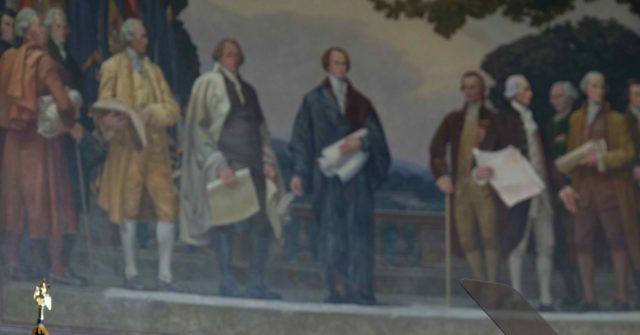As I note at Breitbart, the National Archives has produced a report that declares themselves racist -- including, specifically, the Rotunda in which the nation's founding documents are preserved.
I don't think there could be any serious objections to adding exhibits to the Rotunda that reflect broader participation in the nation's founding. However, the casting of the nation's Founding as racist -- or, at best, incomplete -- is a real problem.
The report declares: "Freedom wasn’t fully chartered by the three documents in the Rotunda." That reflects what one might call a "soft" version of Critical Race Theory: not that the documents are racist as such, but insufficiently anti-racist.
President Trump offered a (p)rebuttal to that argument when he delivered a speech at the Rotunda last September: "America’s founding set in motion the unstoppable chain of events that abolished slavery, secured civil rights, defeated communism and fascism, and built the most fair, equal, and prosperous nation in human history." In other words, freedom was inherent to the documents. Other, later documents simply elucidated and elaborate the original idea.
It is true that later documents -- like the post-Civil War amendments, for example -- added to, and subtracted from, the original text. But a nation that wants to survive must believe that its founding is transcendent. You can have an academic debate, or you can have a nation that preserves the right to that free academic debate, but if you only have the former, you won't for long.
https://www.archives.gov/files/news/archivists-task-force-on-racism-report.pdf
This week’s portion launches the great story of Abraham, who is told to leave everything of his life behind — except his immediate family — and to leave for “the Land that I shall show you.”
There’s something interesting in the fact that Abraham is told to leave his father’s house, as if breaking away from his father’s life — but his father, in fact, began the journey, moving from Ur to Haran (in last week’s portion). His father set a positive example — why should Abraham leave him?
Some obvious answers suggest themselves — adulthood, needing to make one’s own choices, his father not going far enough, etc.
But I think there is another answer. Abraham (known for the moment as Abram) needs to establish his own household. This is not just about making one’s own choice, but really about choosing one’s own starting point. It’s starting over.
Sometimes we start over in fundamental ways even if much that surrounds us remains the same. Sometimes the journey we have to ...
The story of Noah is familiar; the details, less so.
Noah is often seen as an ambivalent figure. He was righteous -- but only for his generation. What was his deficiency?
One answer suggests itself: knowing that the world was about to be flooded, he built an Ark for the animals and for his own family -- but did not try to save anyone else or to convince them to repent and change their ways (the prophet Jonah, later, would share that reluctance).
Abraham, later, would set himself apart by arguing with God -- with the Lord Himself! -- against the destruction of Sodom and Gomorrah, saying that they should be saved if there were enough righteous people to be found (there were not).
Still, Noah was good enough -- and sometimes, that really is sufficient to save the world. We don't need heroes every time -- just ordinary decency.
Hi all -- as I noted last month, I'm going to be closing down my Locals page, at least for tips and subscriptions -- I may keep the page up and the posts as well, but I'm no longer going to be accepting any kind of payment.
Look for cancelation in the very near future. Thank you for your support!













